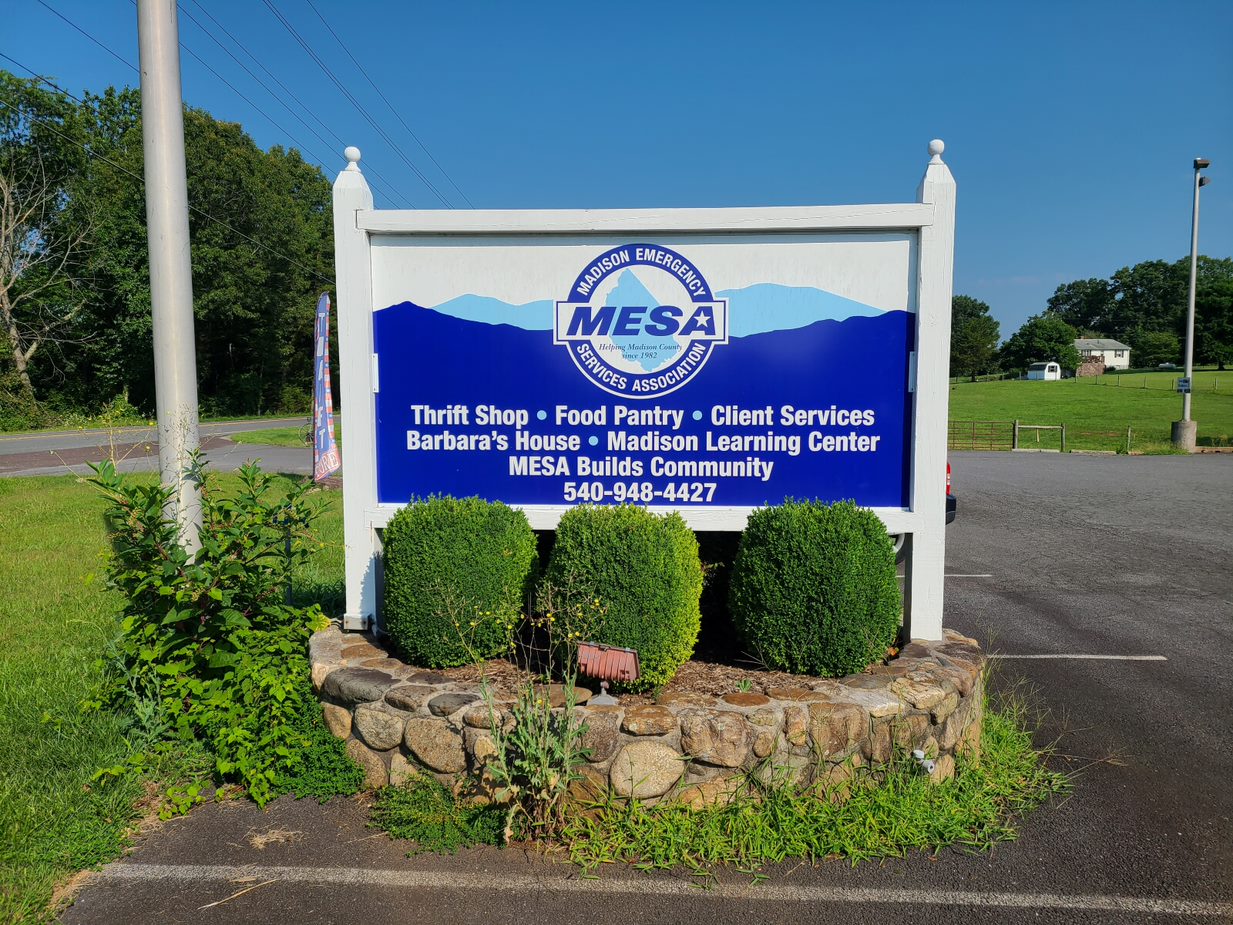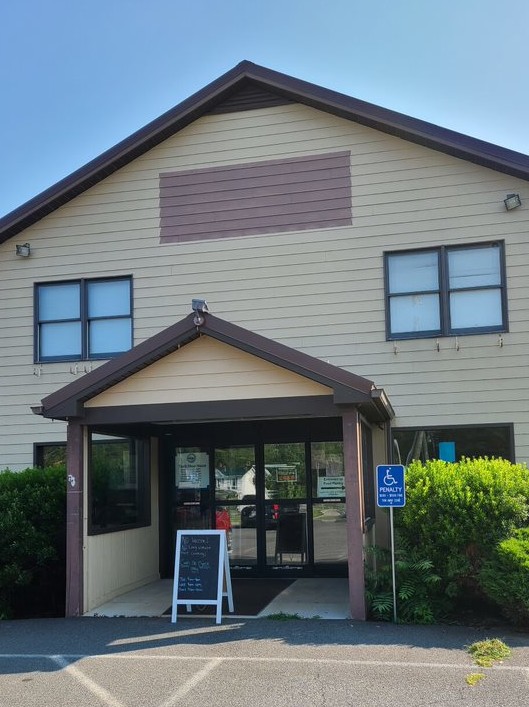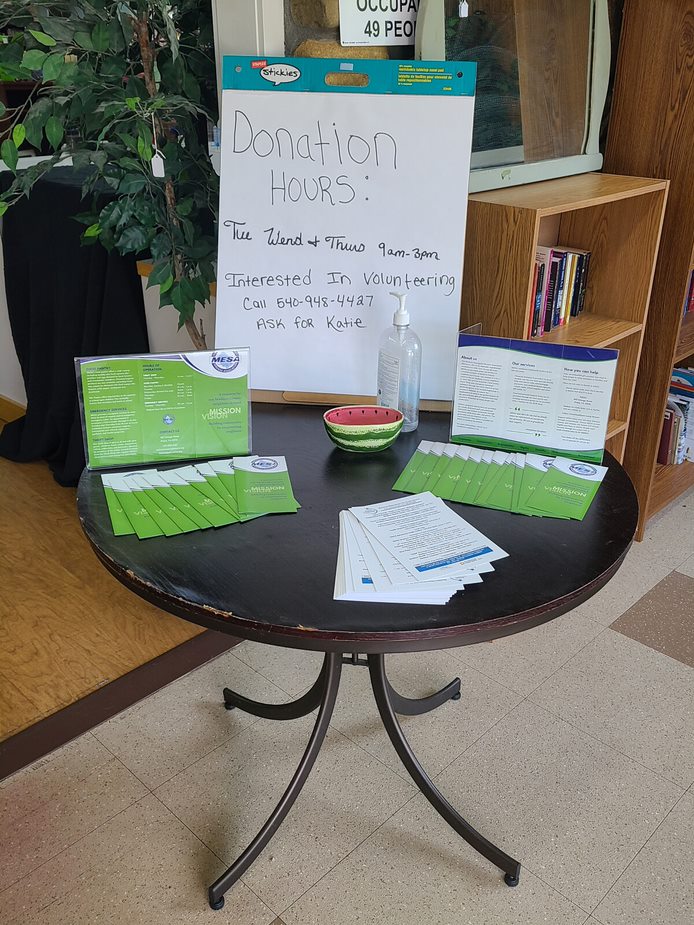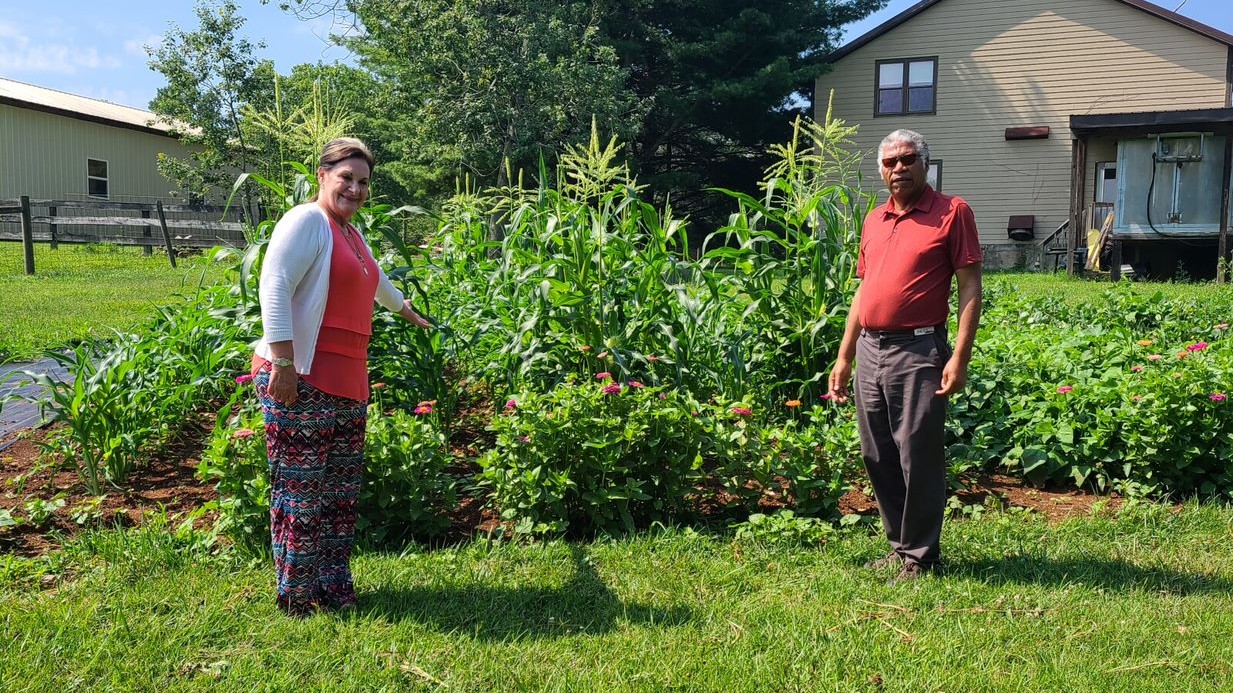Food Bank pantry partner MESA demonstrates what it means to be a community food hub
If you’ve ever spent time in Madison County, you’ve heard about the flood. In 1995, a thunderstorm stalled in the mountains and released a deluge on the rolling hills and farmland below. Flash flooding claimed three lives, and many more lost everything they had to the storm. Crisis is a familiar state of being for many who remember that time, and since then, Madison has experienced other challenges that many rural communities face: a lack of adequate support from state and federal government, aging and nonexistent infrastructure, and since March of 2020, the COVID-19 pandemic. But if you’ve ever spent time in Madison, there’s something else you know: that this is a community that supports itself, that rallies to uplift and empower its own. Since 1982, the Madison Emergency Services Association—MESA—has been a major driver of that support.
Like the Blue Ridge Area Food Bank, founded just one year earlier in 1981, MESA has evolved over its nearly 40 years of serving community members in central Virginia. From a loose collective of individuals guided by Christian faith to meet the needs of Madison County residents, MESA has grown into an independent 501c3 charitable association with 6 paid employees (4 part-time; 2 full-time), a thrift store, and a variety of programs designed to benefit anyone who shows up and has a need. These programs include MESA’s large, on-site food pantry and a U.S.D.A. food distribution program run out of Beth Car Baptist Church, but MESA’s support for individuals extends beyond food. As Executive Director Eleanor Mower explains, “We never turn anyone away… Let’s say they need gas for their car, let’s say they need clothes, we help them.”
Food programs: From the Community to the Community
In 2020, MESA provided food to 2,444 households made up of 6,973 individuals. Many of these individuals live below the poverty line (about 8% of Madison County overall), but a larger percentage are “working poor” whose incomes are too high to qualify for federal benefits but too low to make ends meet. Even for those who do qualify for federal benefits such as SNAP, the benefit provided is often not enough, leaving organizations such as MESA to fill the gap. Luckily, according to Robin Corum, assistant food pantry manager, MESA is “pretty well stocked, thanks to the community.” Robin collects donations from grocery stores in Charlottesville, Ruckersville, Madison, and Culpeper as part of the Food Bank’s Partner Pickup Program. He also gets approached by people on the street, people with home gardens looking to donate to the pantry: “A lot of people know about the food pantry, that that’s where I work, and they see me out in public and they ask me, you know, could you use this, use that. And we get a lot of zucchini and squash, tomatoes… we get the wild onions… And we have, let’s see, one, two, three, four, five families that have gardens at their house, I’ve been to the house and checked out the garden, and they bring us stuff.”

In addition to home gardeners, local farmers and restaurant owners also donate to MESA. Watermelons, pumpkins, giant zucchini—the best the fertile fields of Virginia have to offer all move through MESA’s food pantry, flowing from the community straight back into the community, nourishing neighbors. Support also comes through monetary donations made by individuals and community groups, as well as food drives organized by local churches, the post office, schools, and businesses. In particular, Eleanor says at the outset of the pandemic, “People ran in [with donations], ‘This is for the food pantry, this is for the food pantry.’ So, we have an abundance of food, and we didn’t have to worry for the people coming in. We have plenty of food and we’re doing fine.”
The strong support for MESA is a result of their commitment to the vision of “building community by empowering neighbors”. This sense of empowerment is evident in the trust that has been built between MESA and pantry guests. While the pantry usually doesn’t open until 10 am, guests often gather under the pavilion as early as 8 o’clock to greet each other and catch up; for many, it’s become a social space, a place where “everyone knows your name.” What’s most important to Eleanor, she says, “is that comfort level, that they feel safe coming here to get what they want.”
Pantry guests often give back to MESA as pantry volunteers or by working out back in the community garden, where everyone is encouraged to help, get dirty, and harvest what they want for their kitchen at home. The excess goes back into the pantry, another example of the community providing what the community needs.

Beyond food: Addressing needs holistically
“Everything we do is client services,” says Eleanor. That includes the food pantry but extends well beyond to services such as:
- financial support for critical “life needs”
- referrals to other service providers and government agencies
- mentorship and housing for families in transition
- summer break and Christmas programs for kids
In 2020, MESA assisted 772 individuals with financial support for needs such as utility payments, rent/mortgage, firewood, transportation, and more. Over the holidays, 40 families were provided with presents, gift cards, and dinner baskets thanks to a new partnership between MESA and Catholic Charities. And then there’s Barbara’s House, which “provides families or individuals a safe and secure place to reorganize their lives” where they “can stay rent-free for up to a year, while volunteer mentors help and guide them through their life’s challenges”. Since opening its doors in 2002, Barbara’s house has impacted over 110 families by providing temporary housing, financial and nutrition counseling, parenting guidance, help finding stable employment, and more.
Even in the time of the pandemic, MESA continues to evolve in response to the needs of its guests and community members. For example, they’ve just launched a new home repair program in partnership with Catholic Charities, which was inspired by food pantry guests, many of whom are seniors and/or disabled and live on a fixed income. These individuals shared stories about kitchen leaks, caved-in ceilings, and dilapidated front porches that they could not afford to fix.
Expanded service and creativity during the pandemic
COVID-19 has changed many things, but it never stopped MESA from carrying out its mission. During the pandemic, more visitors from other counties have begun to access their services. The size of clients’ households has also increased, as recently unemployed family members move in together to cut down on housing costs. With the disruptions and changes caused by the pandemic, MESA’s work has become even more crucial. As Eleanor says, “In 2021, we have to do what we do best. We serve people who need something, as best as we can.”
Serving people “as best as we can” sometimes means being creative. As Eleanor recalls, at the beginning of COVID, “We ran out of meat.” Supply shortages caused meat prices to soar, and, for a time, MESA pivoted to providing beans as a primary protein source for pantry guests, along with cooking tips to encourage clients to use them. But thanks to MESA’s partnership with the Food Bank, local stores, and community members, the meat crisis didn’t last long—as Robin recalls, suddenly, the donations were flush with frozen meat again. Even during the leanest times of the pandemic, the shelves at MESA’s food pantry never went empty. “Right now, we are blessed with lots of food,” says Eleanor. The generosity of the community enables MESA to be generous in what it provides to clients. “We’ve not run out of food. So… let’s just give to people, whenever they come. I don’t care if they come Tuesday, Wednesday, Thursday, Friday. If they come here and say they need food, we’re going to give them food.”
Eleanor and her team have kept close watch of the evolving situation as CDC guidance, statewide mandates, and federal support for those most impacted by the pandemic economy have shifted. While overall utilization of food pantry services has been higher than in previous years due to the economic impacts of COVID-19, Eleanor and Robin have watched their numbers rise and fall depending on the availability of government support for their pantry guests—whether it be unemployment or SNAP benefits or deferral on their rent. But now, as stimulus money starts to run out and other policy buffers—such as the eviction moratorium—wind down, that trend is shifting, with more people coming in again to receive food or assistance with bills that are coming due. Government support for individuals and families—not to mention for small organizations such as MESA, which was a beneficiary of the payroll protection program—has been a “good thing,” according to Eleanor, “but [it’s] not long term.”
With well over a year of the COVID-19 pandemic behind us, it’s clear we are experiencing a crisis that will continue for some time to come. What’s unclear is where we go from here, as uncertainty abounds around our ability to contain the virus and around the level to which policymakers will step up to provide relief for struggling communities. But in Madison County, one thing is certain: with a legion of supporters behind it, MESA will be there to share its abundance and bridge the gap.


